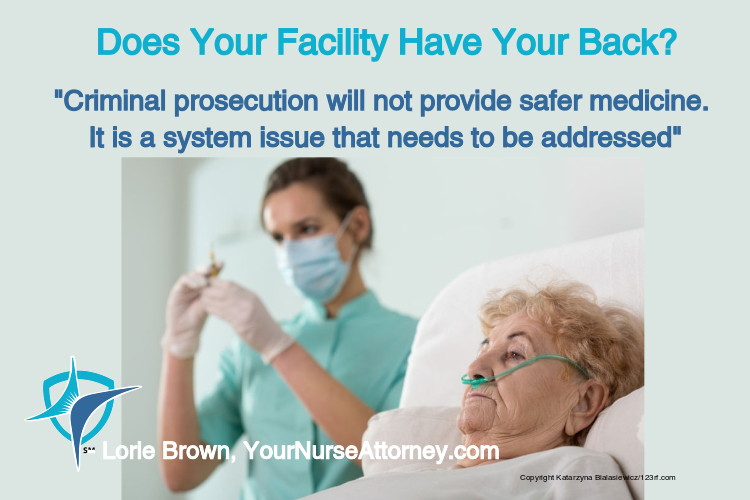
I’m sure you’ve read in the media or on my blog about Nurse RaDonda Vaught who has been charged with reckless homicide for an inadvertent medication error.
In a news article released by hospitalwatchdog.org, they described what Vanderbilt University Medical Center (VUMC) did not do that could have prevented this tragic incident.
Whenever the Centers for Medicare & Medicaid Services investigates, they prepare a deficiency report. When a deficiency report is received by a facility, they must respond to the deficiencies and offer a plan of correction to remedy the deficiencies.
“The real issue in this case is that there were no effective systems in place to prevent or detect the accidental selection, removal, and administration of a neuromuscular blocker that had been obtained via override.”
As in the past, I am in no way saying that Nurse Vaught’s actions were proper. My position is that this is a medical malpractice rather than a criminal matter! However, VUMC did not have her back and fired her rather than fix the system issues that contributed to this error.
Once CMS investigated, VUMC had to put systems in place to prevent these types of problems. In VUMC’s Plan of Correction, the facility has agreed to:
1. Take vecuronium off override. Had vecuronium been taken off override, Nurse Vaught would never have been able to access this medication.
2. Implement bar coding verification in the radiology department. Like most areas, if one takes a medication out of the Pyxis or the med cart and gives it to a patient, the medication’s barcode is scanned. This ensures that the patient is receiving the correct medication. In this situation, if Nurse Vaught would have been able to scan the patient’s wrist band, it would have alerted her that this was not an ordered medication for this patient.
3. Implement the second nurse verification in the radiology department. Having a second nurse review and verify the accuracy of the order and the medication, this would have prevented the death of Charlene Murphy.
4. Require a nurse to enter “PARA” in the automatic dispensing cabinet (ADC). In order to obtain a paralytic drug from the ADC, a nurse must first type in the letters P-A-R-A. This too would have prevented Ms. Murphy’s death.
5. Implement policies that did not previously exist for monitoring high risk medications such as versed or vecuronium. It is surprising that prior to the incident with Ms. Murphy, VUMC did not have policies and procedures to monitor such dangerous medicines. They now do.
The article goes on to question whether the District Attorney (DA) has a conflict of interest because the DA, Glenn Funk, has multiple, personal and professional relationships with Vanderbilt University. He is an Adjunct Professor at the Vanderbilt School of Law, served on the Vanderbilt Kennedy Center Leadership Council and he and his wife are members of the Next Step Advisory Council at the Special Education Department at Vanderbilt’s Peabody College.
Criminal prosecution will not provide safer medicine. It is a system issue that needs to be addressed.
It should go without saying that Vanderbilt and VUMC attempted to cover up this tragedy and the Murphy family did not even know of the situation for almost a year after the incident. My heart goes out to Ms. Murphy’s family, to RaDonda Vaught and to all of the nurses who everyday put their health, their lives, their well-being on the line in the service of others.








Marie Alden says
I am a firm believer that a facility does not have the nurses back when something like this happens. Nurses are expected to multitask, make tough decisions, provide excellent customer services, all while often not getting breaks and being constantly interrupted. Something bad happens, and they fire the nurse. I’m not minimizing what nurse vaught did… but, I often wonder how her day was going.
Shane says
I agree making her a criminal is horrific. The hospital should take full 80% of ownership in this. Again it is the hospital administration that oversees the work environments. How many times does a nurse work overtime, no lunch break is taken, and the nurse leaves late. How many times? As nurses we are suppose to suck it up, and the drive on…but I thought that was just the military stance on things.